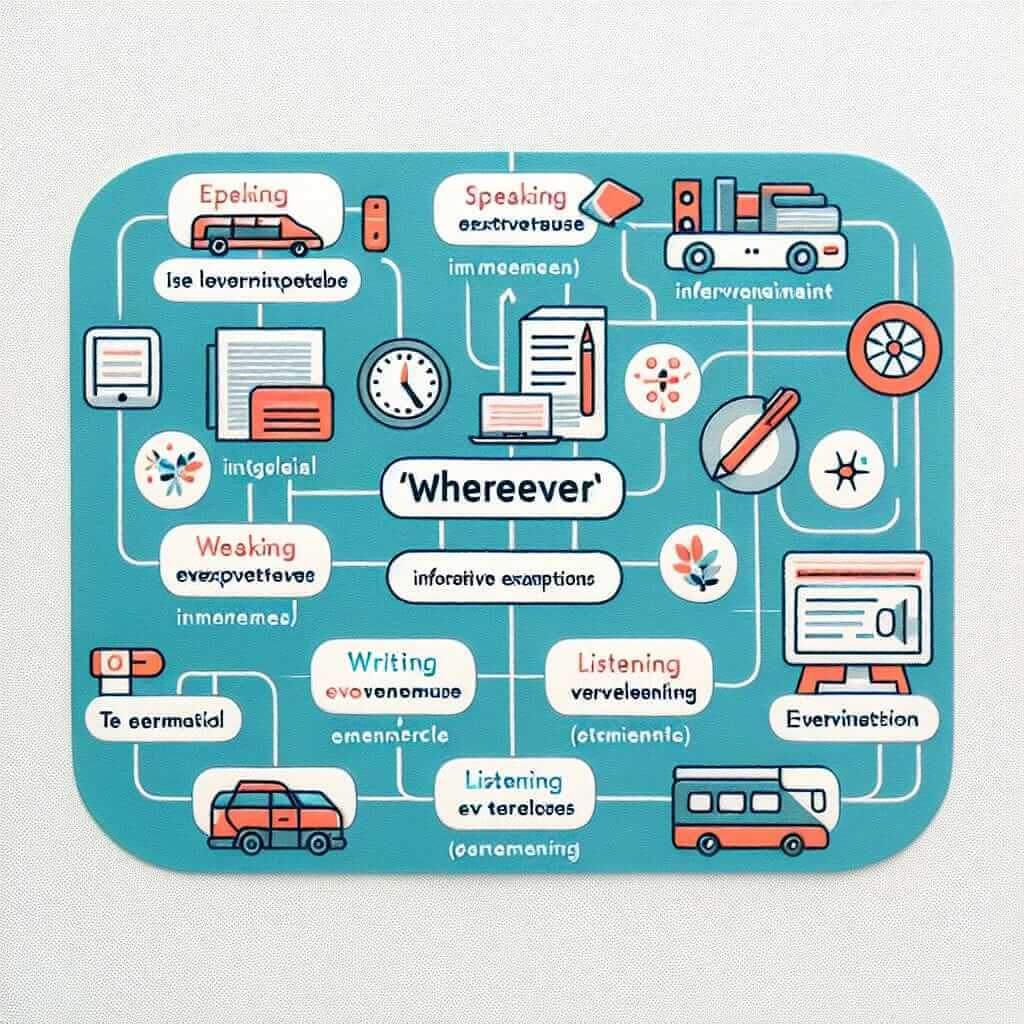“Wherever” might seem like a simple word, but using it effectively can add sophistication and clarity to your IELTS responses. Whether you’re describing a location, expressing a lack of restriction, or highlighting a conditional situation, understanding the nuances of “wherever” can significantly impact your score.
Here are some examples of how “wherever” can be used in different sections of the IELTS exam:
Speaking Part 2:
- “My dream holiday destination? That’s a tough one! I’m happy wherever there’s sunshine, a beautiful beach, and a good book.”
Writing Task 2:
- “Some argue that strict censorship is necessary to maintain social harmony. However, history has shown that restricting freedom of expression, wherever it occurs, often leads to more significant problems.”
Listening Section 2:
- “The campsite has excellent facilities, including hot showers and laundry rooms. You can set up your tent wherever you like within the designated areas.”
In each of these examples, “wherever” adds a layer of meaning related to place or condition. Let’s delve deeper into how this versatile word functions grammatically.
Understanding “Wherever”
“Wherever” is a relative adverb that expresses a lack of restriction regarding place or situation. It’s often used to introduce a clause that describes a general location or condition.
1. Meaning and Usage in IELTS
In the IELTS exam, using “wherever” demonstrates your grasp of complex grammatical structures and allows you to:
- Express a Lack of Limitation: You can use “wherever” to show that something applies in any location or situation.
- Highlight a Condition: “Wherever” can be used to introduce a conditional clause, indicating that something is true or will happen under a specific circumstance related to place.
2. Grammatical Structure and Analysis
“Wherever” can be used in several grammatical constructions:
a) Introducing an Adverbial Clause of Place:
- Structure: Wherever + subject + verb, [main clause]
- Example: Wherever you go, I’m sure you’ll have an amazing time.
- Analysis: “Wherever you go” acts as an adverbial clause modifying the verb “have” in the main clause. It signifies that the speaker believes the listener will have a good time regardless of their location.
b) Introducing a Noun Clause:
- Structure: [Main clause] + wherever + subject + verb
- Example: I can’t remember wherever I left my keys.
- Analysis: “Wherever I left my keys” is a noun clause acting as the object of the verb “remember.” The speaker is unsure of the specific location where they left their keys.

3. Application in IELTS Writing and Speaking
Writing Task 1 (Describing Maps):
- “Wherever new housing developments were constructed, green spaces were incorporated to maintain a balance between urban growth and environmental preservation.”
Speaking Part 3 (Discussing Abstract Ideas):
- “The internet has created a global village, allowing us to connect with people wherever they are in the world.”
4. Achieving a Higher Band Score
- Combine “wherever” with more complex sentence structures: “Wherever opportunities for cultural exchange arise, individuals should seize them to broaden their perspectives and foster global understanding.”
- Use “wherever” to express nuanced ideas: “Some may argue that true happiness is elusive, a destination that can never be reached. However, I believe that contentment can be found wherever we choose to cultivate gratitude and appreciate the present moment.”
5. Common Mistakes and How to Avoid Them
-
Incorrect Pronoun Usage: Ensure that the pronoun after “wherever” agrees with its antecedent.
- Incorrect: Wherever you go, make sure they bring a map.
- Correct: Wherever you go, make sure you bring a map.
-
Confusing “Wherever” with “Where”: “Wherever” implies a lack of restriction, while “where” refers to a specific location.
- Incorrect: I always feel at home wherever I am.
- Correct: I always feel at home where my family is.
Conclusion
Mastering the use of “wherever” can undoubtedly enhance your IELTS performance. By understanding its various applications and incorporating it accurately into your writing and speaking, you can demonstrate a strong command of English grammar and vocabulary, ultimately leading to a higher band score. Remember to practice using “wherever” in different contexts and pay close attention to the nuances of its meaning to unlock its full potential in your IELTS exam.